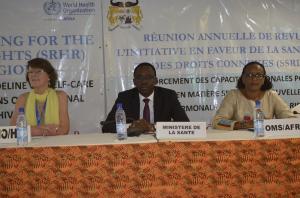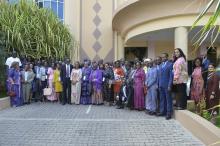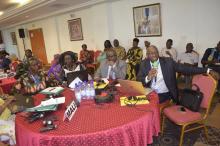Benin hosts the first annual review and planning meeting of the initiative for access to Sexual and Reproductive Health and Rights in Africa
Cotonou - The Azalai Hotel in the economic capital served as the setting for the official opening ceremony of this important meeting bringing together about one hundred participants from eleven sub-Saharan African countries (Tanzania, Sierra Leone, Nigeria, Niger, Mali, Guinea, Kenya, DRC, South Africa, Rwanda, Burkina Faso and Benin).
A solemn and colourful ceremony marked the start of the work, presided over by Dr Pétas Akogbeto, Director of Cabinet of the Minister of Health, surrounded by Dr Triphonie Nkurunziza, Regional Adviser for Maternal and Reproductive Health at the WHO Regional Office for Africa and Mrs Mary Lyn Gaffield, Family Planning Specialist at WHO Headquarters in Geneva, Switzerland.
The two interventions at the meeting focused on the need to concentrate on providing appropriate care for women at various risks, including unintended pregnancies, strengthening regional capacity to implement WHO guidelines self-management interventions of sexual and reproductive health and rights (SRHR). These include new recommendations on hormonal contraception for women at high risk of HIV infection.
On behalf of the WHO Regional Director for Africa, Dr Triphonie NKURUNZIZA emphasized the key objectives of this regional meeting which are: to take stock of progress made, discuss challenges and identify practical solutions to strengthen the implementation of the initiative to promote and protect sexual and reproductive health and rights in the African Region.
According to the Regional Advisor, "this initiative which was launched within the framework of Universal Health Coverage (UHC) focuses on the provision of a comprehensive range of services related to sexual and reproductive health and rights. This initiative specifically targets the most vulnerable populations and people living in humanitarian crises. It targets, as a priority, countries facing a high burden of unintended pregnancies and its corollaries and that have demonstrated their commitment to eliminating maternal deaths from these preventable causes".
The following four countries have been selected for the first initial phase planned for 2019: Benin, Burkina Faso, Rwanda and South Africa. WHO indicates that this programme will have to be progressively extended to other countries in the African Region. The Cotonou meeting is also an opportunity to disseminate WHO guidelines on self-management interventions for sexual and reproductive health and rights. It will also be an opportunity to disseminate recommendations on hormonal contraception for women at high risk of HIV infection.
Dr. Triphonie NKURUNZIZA said that in Cotonou, participants will have the opportunity to discuss the implementation of the WHO Family Planning Accelerator Project, financially supported by the Bill and Melinda Gates Foundation and focusing on Post-Partum Family Planning. The Accelerator Project is targeting eight countries in the African Region for the period 2019-2022: DRC, Guinea, Kenya, Madagascar, Mali, Niger, Nigeria and Tanzania.
In officially opening the proceedings on behalf of the Minister of Health, the Director of Cabinet thanked the participants for their presence in Cotonou, which is part of the annual review and planning of interventions of the Sexual and Reproductive Health and Rights Initiative. According to Dr Pétas AKOGBETO, maternal morbidity and mortality rates are still quite high in most African countries.
The Director of Cabinet of the Minister of Health indicated that in Benin, according to the Demographic and Health Survey (DHS, 2018), maternal mortality is 391 per 100,000 live births which has not varied significantly for more than 20 years, for an expected target of 70 deaths per 100,000 live births in 2030 in accordance with the SDGs. Contraceptive prevalence for modern methods remains low (12%), although significant progress has been made over the last ten (10) years. This situation is, according to him, superimposable to the realities of many African countries. He said that "the challenge we face is enormous but surmountable."
The Director of Cabinet of the Ministry of Health stressed that "the commitments made by the different African countries towards the Sustainable Development Goals (SDGs) must lead us to take bolder measures against the known causes of maternal deaths: hemorrhages (25%), eclampsia (12%), infections (15%) and abortions (13%).
“The actions to be implemented are within our reach”, he stressed, “and must be able to ensure access to sexual and reproductive health services for all and give every girl or woman the choice to have a free and informed sexuality, responsible, without violence, without discrimination and in respect of human rights. It is our duty to ensure this".
Email: agossouf [at] who.int (agossouf[at]who[dot]int)
Chargée de communication en appui aux pays francophones
Bureau régional Afrique de l’OMS
Email : asekpon [at] who.int (asekpon[at]who[dot]int)





